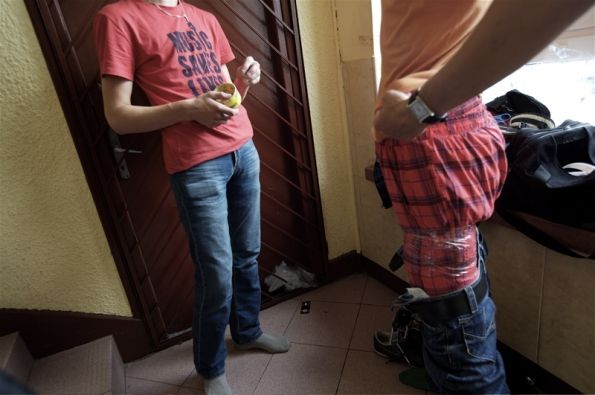A stone's throw from the Poland-Belarus border, Andrei, an unemployed engineer, waited on a recent afternoon for a "friendly” border guard to go on duty. A bundle of copper piping and toilet paper sat on the backseat of his estate car, the only visible items he had bartered for a tankful of petrol. The rest of his goods were hidden in secret compartments. Chain-smoking to calm his nerves, he cursed the hyper-strict regime of the Belarusian president, Alexander Lukashenka, for new restrictions that had made an already tough line of work even harder. “They don’t give a damn about us,” he said, moments before the call came and he sped to the checkpoint, his brother and father trailing in vehicles behind him.
Until this year, the Belarusian smugglers that ply the borderlands did a brisk business shuttling petrol refined from cheap Russian oil into Poland, their boots brimming with cigarettes and vodka. They brought plenty of dollars with them—enough to sprout more than a dozen foreign-exchange bureaus in a rural town of 3,200 people—and returned home with flat-screen televisions and refrigerators. But an economic crisis marked by plunging budget revenues and inflation has prompted Belarus to seal its borders with the West to restrict the resale of oil and other products, cramping the livelihoods of those who supplement meagre incomes hustling on the black market.
Tempers are starting to flare. Earlier this month, hundreds of cars blocked the centre of the capital for the best part of a day to demand lower fuel prices. These were not the brash young members of the flash-mobs that gather every week in Oktyabr Square for anti-government hand clapping, but the typically passive blue-collar types who make up Mr Lukashenka's support base. And they were just getting started. In a rare concession to the street, Mr Lukashenka ordered that prices be lowered the next day, only to be confronted by a fresh wave of protests around the country against new rules limiting the frequency of cross-border travel. (The law was changed from daily to once every five days.) In Grodno, angry motorists blocked the border for several hours until they were forcefully dispersed by police tear gas.
Near Brest, protesters who demanded an end to fuel quotas were subdued by local authorities. The subtext was clear, however: in a state-controlled economy where the price and availability of staples are taken for granted, hiccups in the system are not easily tolerated. Making matters worse for ordinary Belarusians, the restrictions have been expanded to other goods produced by heavily-subsidised state industries, ranging from pasta to gas stoves. Starting this month, duty rates on imported cars will rise four-fold. With many basic food and domestic items in ever-shorter supply as foreign imports diminish and concerned consumers, especially in the countryside, begin to stockpile goods, Belarus grows more isolated by the week. Under the tense circumstances, border smugglers must make the most of every opportunity they get, no matter how small.
Or how brazen. Ten minutes before the arrival of the day’s last train back to Belarus, the screech of sticky tape fills the main hall of Kuznitsa's train station. Off to one side, a row of plump women have shed their blouses to wrap layers of packaged tights and underwear around their torsos. In another corner, three teenage boys, trousers below their knees, try to compress the dozen-plus pairs of boxer shorts they have somehow managed to squeeze on. Eighteen-year-old Dima says they will fetch a $1 profit a piece at the market in Grodno, yielding him an extra $60 a month.
Lucky for him, the Polish authorities are more sympathetic than his dour countrymen in uniform. “Life is too hard in Belarus right now, so I have to give them a break,” says Lieutenant Kristof, a 17-year veteran of the border guard, who watches over the packing spectacle, non-plussed. “I feel sorry for these people.”
